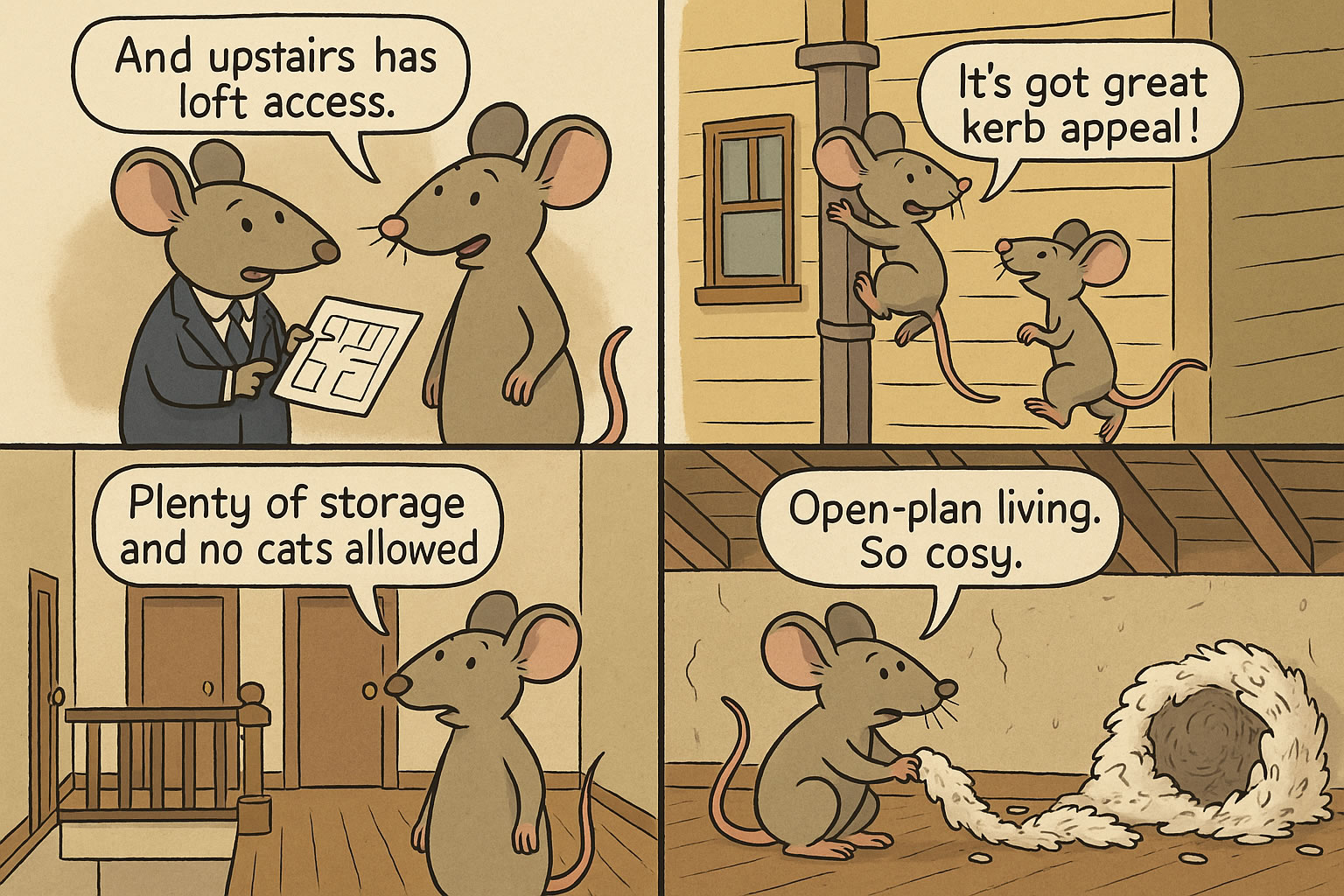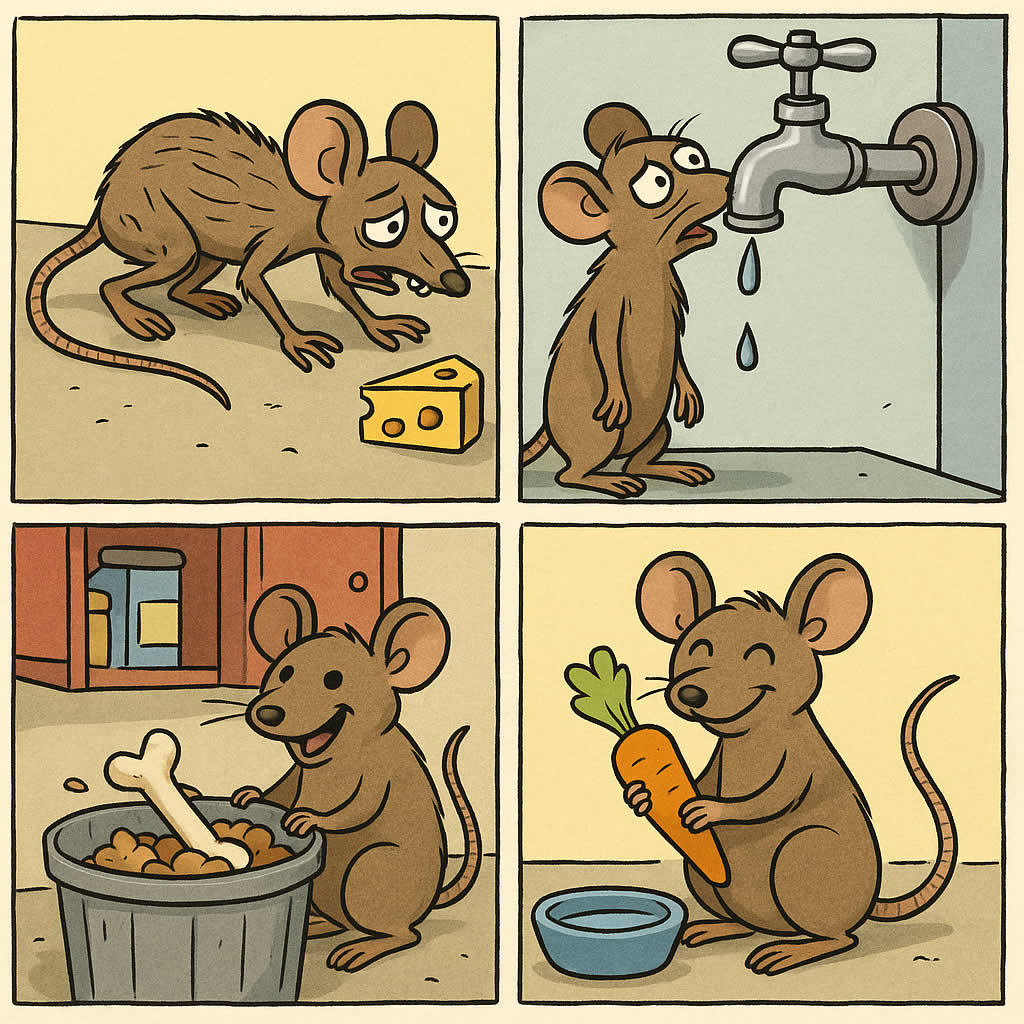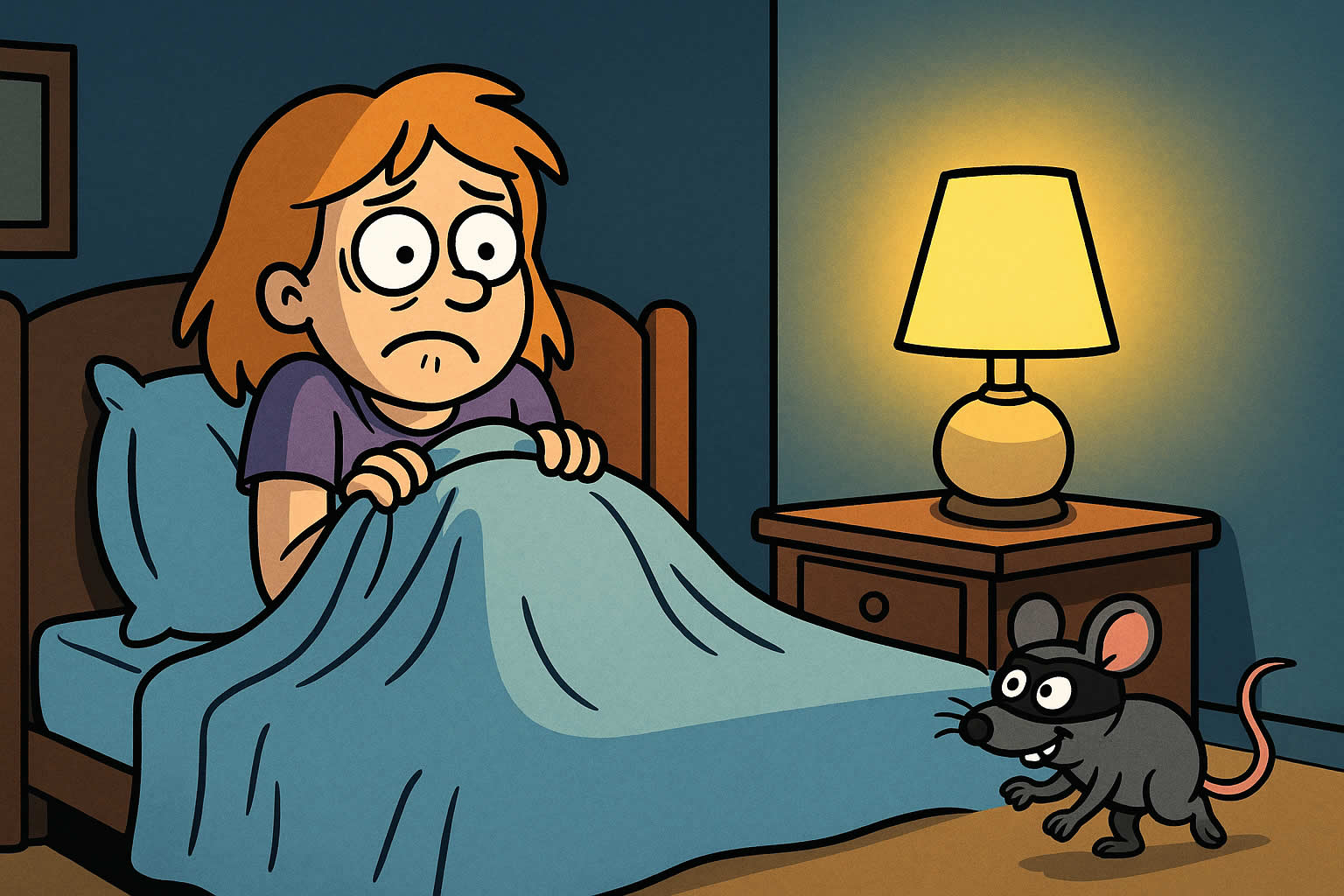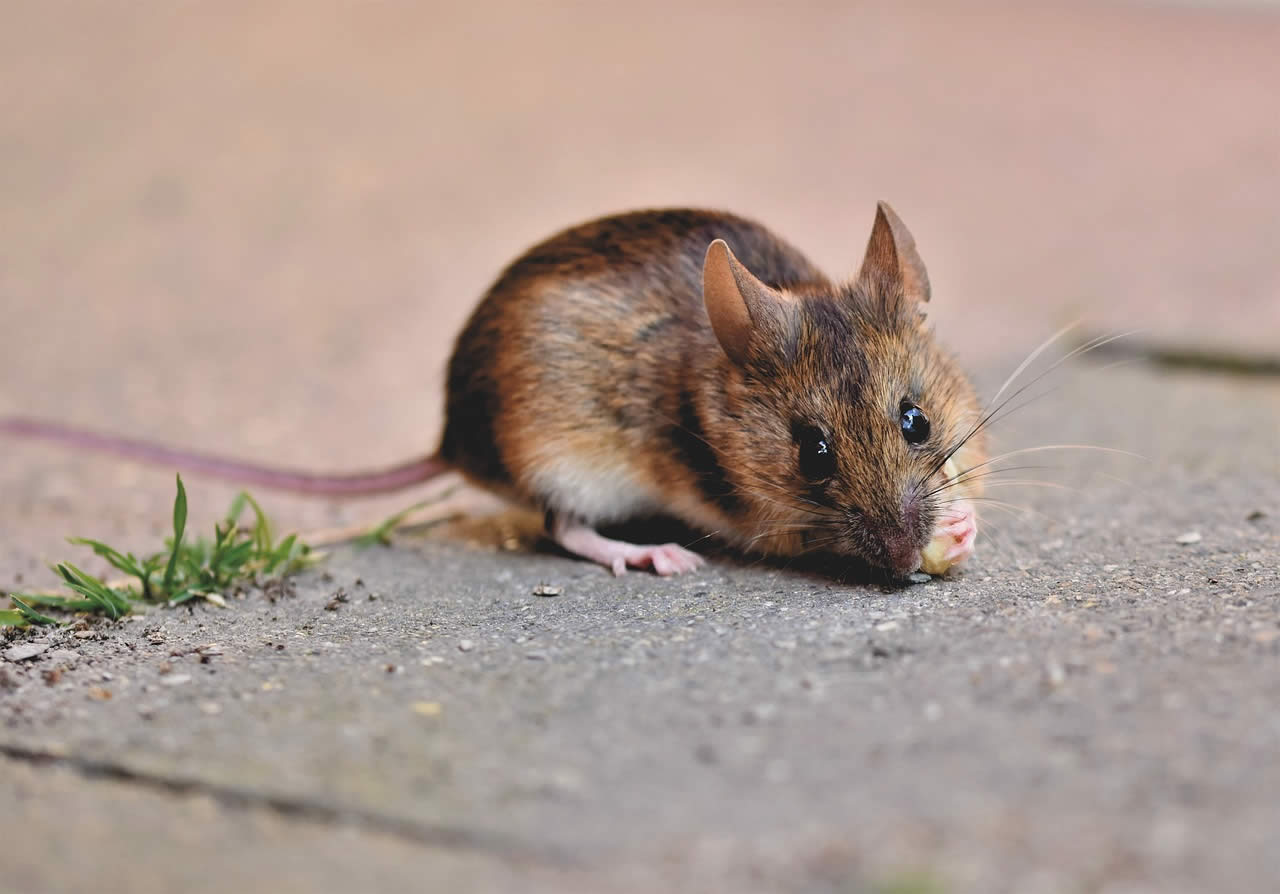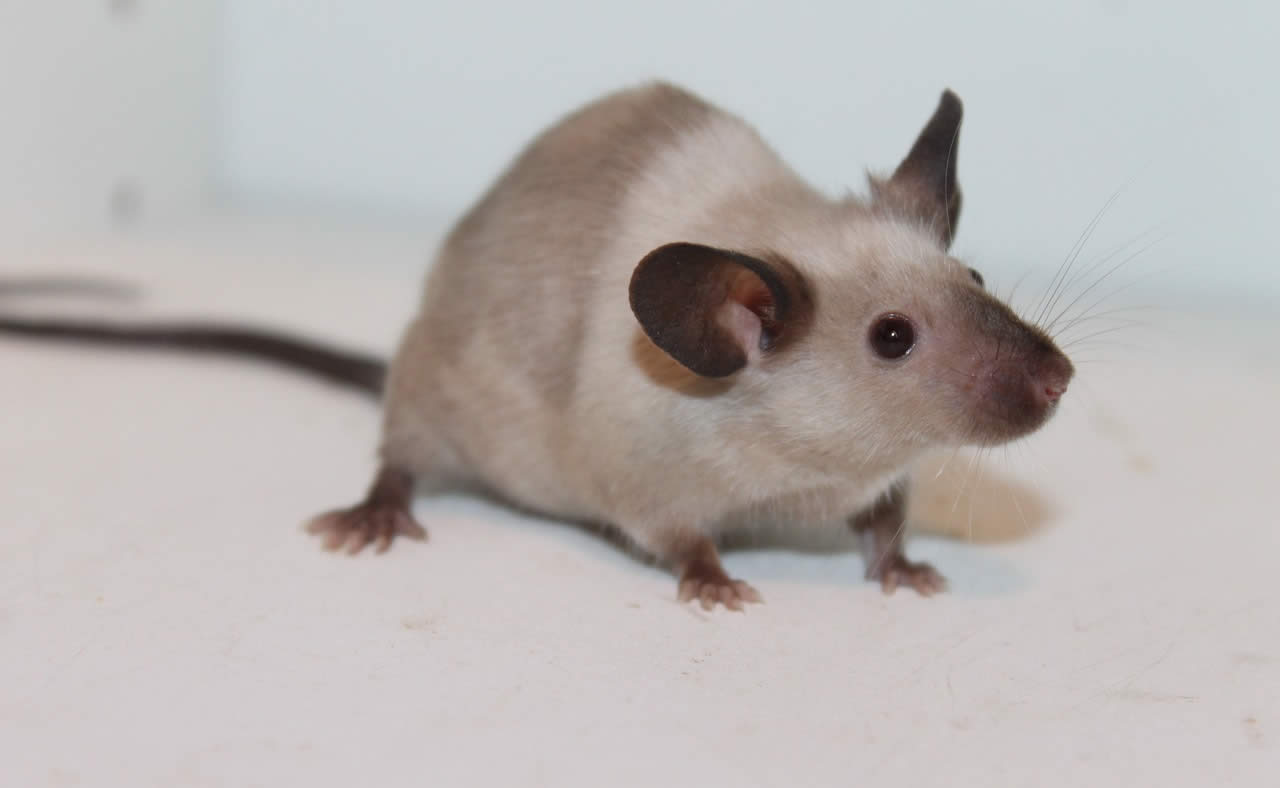Related Queries
ToggleIf you’ve heard scratching in the ceiling or spotted droppings on your bedroom carpet, you’re not imagining things. Mice do go upstairs, and in many cases, they’re already there before you even realise.
In this guide, you’re going to learn why mice travel upstairs, how they get there, and what you can do about it—based on real pest control experience from homes across the UK.
Let’s walk through it together.
Can mice climb stairs and walls?
Yes, absolutely. Mice are excellent climbers. Their sharp claws and light bodies allow them to scale almost any surface with a bit of texture—like brick, plaster, wooden skirting boards, or carpeted stairs.
If you think upstairs rooms are safe from rodents just because they’re high up, think again. Mice will go wherever they feel warm, safe, and undisturbed—and that includes lofts, upstairs bedrooms, airing cupboards, and even the top of kitchen cabinets.
They’ll climb up:
- Behind pipes in boxed-in ducting or central heating routes
- Cavity walls if there’s even the smallest gap
- Furniture, curtains, or even up the edges of radiators
- Staircases, especially if carpeted or near a wall
I’ve seen mice nesting inside upstairs wardrobes and airing cupboards—completely unnoticed for months—because they found easy access routes through floorboards and wall voids.
Why would mice go upstairs in the first place?
Mice don’t have a sense of territory in the way we do. If they’re in your home, they’re exploring all of it. Going upstairs isn’t unusual—it’s part of their search for food, warmth, shelter, and nesting materials.
Common reasons include:
- It’s quieter upstairs, especially in spare bedrooms or storage spaces
- There’s insulation to nest in, like fibreglass in the loft or clothes in drawers
- Less activity, making it safer to move around without being disturbed
- Central heating pipes run upwards, keeping voids warm even in winter
- Food crumbs or pet food in bedrooms or bathrooms, especially in homes with children
Once they’re up there, they’ll often stay. If they find soft materials to shred and water from a dripping tap or toilet, they’ll have no reason to leave.
How do mice get upstairs from the ground floor?
They’re not teleporting. Mice usually make their way up through the house gradually, often through gaps and hidden spaces that aren’t visible at eye level.
Here are the most common routes:
- Wall cavities
Many UK homes have empty spaces between internal and external walls. Mice slip through these, climbing up the inside like it’s a hollow tunnel. - Pipes and ducts
Mice follow the paths of plumbing and heating pipes. These often run vertically through a home, giving mice direct access to upstairs rooms, airing cupboards, and even loft spaces. - Under floorboards
Gaps around radiator pipes or electrical cables often lead into the floor void. From there, it’s a short trip to the next level. - Stairs and skirting
If all else fails, mice will just climb the stairs. It might seem strange, but carpet fibres and skirting board edges give them all the grip they need.
How can you tell if mice are upstairs?
You’ll usually hear them before you see them.
Keep an ear out at night for:
- Scratching or rustling behind the walls or ceilings
- Tapping or scurrying across floorboards or loft boards
- Chewing sounds, especially around electrical items or pipes
Other signs include:
- Droppings – small, dark pellets, often found in corners or near food
- Urine smell – strong and musty, especially in enclosed spaces
- Shredded fabric or paper – used for nesting
- Grease marks – from fur rubbing along skirting boards
It’s worth checking warm, undisturbed spots like behind storage boxes, in wardrobes, or under beds. Mice love those areas.
What should you do if you think mice are upstairs?
The first thing is to confirm they’re there. Don’t assume it’s just noise from outside—most upstairs mouse problems start in the walls and ceilings, and that’s inside your home.
Here’s what you can do:
- Find out how they got in
Most infestations start on the ground floor. Mice often enter through:
- Gaps around pipes or drains
- Air bricks or vents
- Cracked brickwork or mortar
- Gaps under doors or around utility boxes
Once they’re in, they explore. So even if you’ve only noticed signs upstairs, the entry point is probably downstairs or outside.
- Block the gaps they’re using
Use materials like:
- Steel wool and silicone sealant for small gaps
- Wire mesh over vents or air bricks
- Expanding foam (only in combination with steel wool—never on its own)
Focus on areas around pipework, especially in kitchens, under sinks, and in airing cupboards where pipes go between floors.
- Set traps in active areas
Place snap traps or humane traps along walls where you’ve seen signs. Avoid the middle of the room—mice rarely cross open space. Good bait options include:
- Peanut butter
- Chocolate
- Birdseed
- Oats and bacon grease
If you’re setting traps upstairs, focus on dark corners, behind furniture, or inside airing cupboards.
- Clean up food and nesting materials
Remove anything that might attract mice, such as:
- Food wrappers or crumbs in bedrooms
- Pet food left out overnight
- Piles of clothes or paper
- Open bags of bird seed or pet bedding in lofts
It doesn’t take much to keep a mouse happy, so staying tidy makes a real difference.
How long can mice stay upstairs without going back down?
If they’ve got a nest, warmth, and access to food or water—even just dripping condensation—they can stay upstairs for weeks or even longer.
In many cases, homeowners only discover the problem when it becomes severe. I’ve been called to properties where mice lived in loft insulation for months, only coming down at night when the house was quiet.
That’s why it’s so important to deal with the root cause, not just the upstairs symptoms.
Can mice live in the loft or attic?
Definitely. Loft spaces are ideal for mice. They’re warm, dry, quiet, and packed with insulation to shred. What’s more, few people check the loft regularly—so mice can go unnoticed for a long time.
Lofts often have:
- Soft insulation (like fibreglass or wool)
- Cardboard boxes full of clothes or paper
- Gaps where roof timbers meet brickwork
- Entry points around soffits or vents
If you’ve noticed activity upstairs but can’t find the source, the loft is the first place I’d check.
Are there times of year when mice go upstairs more?
Yes—autumn and winter are the peak seasons.
As temperatures drop, mice seek warmer spaces. You’ll often find they move into the lower part of your home first, then gradually spread to upstairs rooms or the loft once they’re settled.
Keep an eye out between October and February. If you catch the signs early, you’ll have a better chance of stopping them before they get upstairs.
How can you stop mice from reaching upstairs?
Once they’re inside the walls, it’s hard to block their movement. But there’s still a lot you can do to stop them getting comfortable.
Home-tested tips that work:
- Use peppermint oil on cotton pads near skirting boards or behind radiators. It won’t fix the problem alone, but it can deter them while you seal up gaps.
- Ultrasonic devices can be effective in small rooms or lofts, though placement is key—they don’t work through walls.
- Lay talc or flour along floor edges to track movement. It helps you figure out where they’re going, especially at night.
- Schedule routine loft checks every two months, especially in winter
If you’ve blocked the entry points and kept the upstairs unwelcoming, mice will either stay away or head back down, where they’re easier to catch.
Should you call a pest control professional?
If you’ve:
- Seen signs in multiple upstairs rooms
- Heard them regularly at night
- Tried traps and sealing but the problem’s not going away
…it’s time to get help.
A professional can:
- Identify and block all the hidden entry points
- Use stronger, regulated treatments if needed
- Place tamper-proof bait stations in the loft or wall voids
- Advise you on long-term prevention, tailored to your home
In many homes I’ve treated, upstairs activity turned out to be just the tip of the iceberg. It’s always better to act early.
FAQs: Do Mice Usually Go Upstairs?
Can mice climb stairs easily?
Yes. Most mice can climb carpeted or textured stairs without a problem. They’ll also scale pipes or furniture to reach higher floors.
Do mice live in bedrooms?
Sometimes. If it’s quiet and undisturbed, they may build nests behind wardrobes, under beds, or in lofts above bedrooms.
Will mice leave on their own?
Unlikely. Once they find a warm, safe space with food nearby, they’ll stay until it becomes unsafe or uncomfortable.
How many mice could be upstairs?
If you’ve seen signs, it’s probably more than one. Mice reproduce quickly, and a single pair can turn into dozens in a few months.
Is it safe to sleep in a room with mice?
It’s not ideal. While they won’t attack you, they can carry bacteria and trigger allergies. You’ll also struggle to sleep through the noise.
Do ultrasonic pest repellents work upstairs?
They can, but only in open spaces with no walls blocking the sound. They’re better as a support measure than a standalone solution.
How do I know if they’re in the loft or wall cavity?
Try listening at night for movement. You can also lift a loft hatch and shine a torch—look for droppings, nests, or shredded insulation.
Final thoughts: Do mice usually go upstairs? Yes—and you need to act fast
Mice are more agile, persistent, and clever than most people expect. Once they’re inside your home, they’ll go wherever it’s warm, quiet, and safe—and that often means upstairs.
The key is to act quickly:
- Find where they’re getting in
- Block access between floors
- Clean up food and nesting spots
- Use traps and monitor movement
- Call in a pro if needed
With the right steps, you can stop mice from turning your upstairs into their new home.
If you’ve got signs upstairs and you’re not sure where to begin, start with the loft. That’s where most of the real activity hides.
Let me know if you want help with a checklist or want to build a DIY mouse-proofing routine.
Are you looking for pest control in Cambridgeshire? Get in touch with us and a local pest removal company will be in touch.
Pest Control Upper Gravenhurst – Pest Control Oakley – Pest Control Lower Shelton
